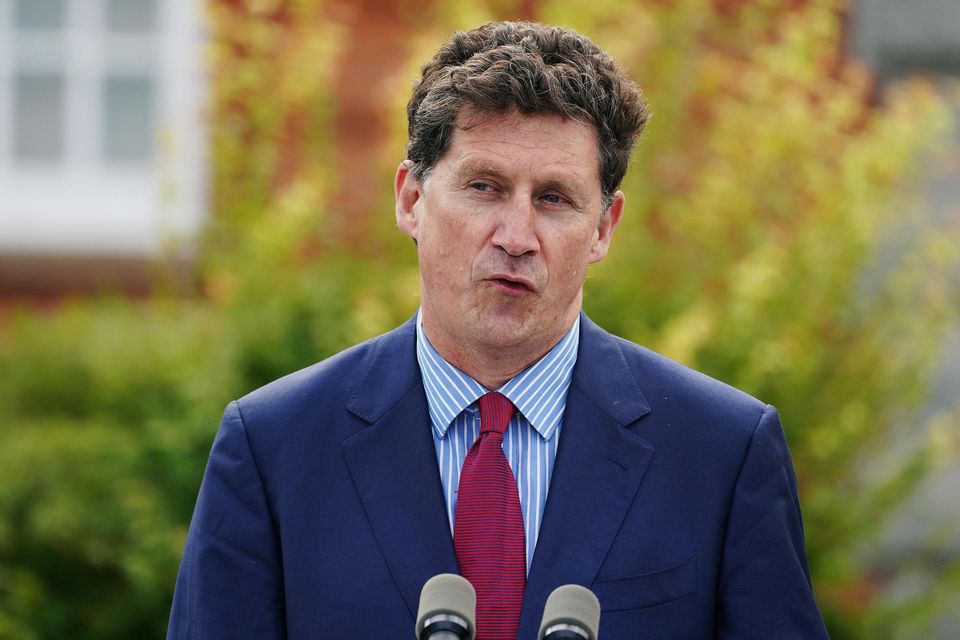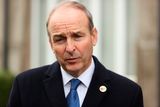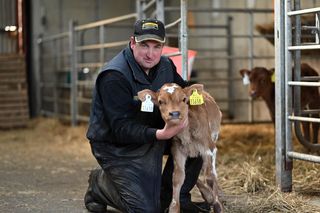Greens climb down on emissions but few left happy with climate deal
:: Target below upper limit set out in carbon budget
Green Party leader Eamon Ryan
The Green Party has significantly climbed down from its demands of high carbon emission targets for the agriculture sector to strike a deal with Fianna Fáil and Fine Gael.
However, the agreement requiring farmers to reduce emissions by 25pc before 2030 has infuriated the sector with industry bodies insisting the target is unachievable.
Green Party leader Eamon Ryan insisted there were “no winners or losers” in the talks after he revealed the 25pc rate for farmers, which is far below the 30pc he demanded.
Mr Ryan and Agriculture Minister Charlie McConalogue announced the targets for a range of sectors which were all below the upper limit set out in the carbon budget.
The reduced rate for farmers, which was pursued by Fianna Fáil and Fine Gael, sparked anger in the Green Party.
Green Party TD Patrick Costello accused the Government of giving agriculture a “pass” despite the high level of carbon emissions the sector is responsible for emitting.
Read more
“We need to see the details of who’s going to pick up the slack for giving agri-business the pass,” Mr Costello said.
Culture minister Catherine Martin’s brother, Green Senator Vincent P Martin, said it is “dismaying” that an issue which should be an “imperative” becomes a negotiation.
“A huge job of work remains to be done to communicate effectively to the farming sector that apart from being the only right and responsible thing to do, this is an opportunity for betterment, not a burden,” Mr Martin said.
Climate Change Advisory Council member Dr Cara Augustenborg said all three parties in the Coalition will be disappointed they had to compromise during the talks but added: “Unfortunately, the atmosphere doesn’t understand compromise.”
A senior Green Party source said Fianna Fáil and Fine Gael spent weeks “destroying their climate credentials” for the Irish Farmers Association (IFA)
“They have actively argued against reducing emissions while Europe burns, and the choose lobbyists over the planet. Young people will remember this in the next election,” the source added.
Meanwhile, farmer representative groups also criticised the Government for failing to keep the target to the lower limit of 22pc.
IFA president Tim Cullinan said the deal is “all about the survival of the Government rather than survival of rural Ireland”.
“They have no idea of the economic and social impact of today’s decision on the farming sector or rural Ireland. Farmers across the country will be rightly worried about what this means for their future,” he said.
Irish Creamery Milk Supplier Association (ICMSA) president Pat McCormack said the deal was a “sell-out of the family farm model”.
Mr McCormack said pushing for 25pc reduction over an eight-year timeframe moved the policy from “difficult” to “impossible” and insisted the targets were no longer credible.
However, Minister McConalogue said farmers are “up for” achieving the emissions targets and he insisted the Government will support the sector to make changes.
“People are obviously anxious about how we are going to move forward but as a government we are very determined across sectors to back families, back citizens, and back farm families to go on this journey,” he added.
The Green Party pointed to “add-ons” in addition to 25pc reduction in emissions which will focus on encouraging farmers to produce more solar energy, gas through anaerobic digestion and extra forestry.
Chair of the Green Party Pauline O’Reilly, who on Wednesday suggested the Greens could collapse the Government over a 22pc reduction, said the reductions would increase from 25pc to 30pc with “add-ons”.
“We were very concerned with the suggestion that this would be pushed out until September. Thankfully that was avoided,” she said.
“The negotiations were clearly intense. The real work of dramatically changing the agricultural system while supporting farmers to ensure that their incomes are protected is urgent.”
The Government has insisted farmers will not be compelled to change how they make their living but will instead be encouraged to become more sustainable.
The other sectoral targets will see carbon emitted from electricity reduced by 75pc, transport 50pc, commercial buildings 45pc, residential 40pc and industry 30pc.
The figures are legally binding and Government departments will be responsible for reducing the emission under the remit.
New policies will be introduce over the coming years aimed at achieving the targets. The policies can be changed from year to year depending on the progress of reducing emissions by a certain sector.
Government grants, especially in the agriculture sector, will be reliant on farmers drawing down the funding meeting climate targets.
Join the Irish Independent WhatsApp channel
Stay up to date with all the latest news















